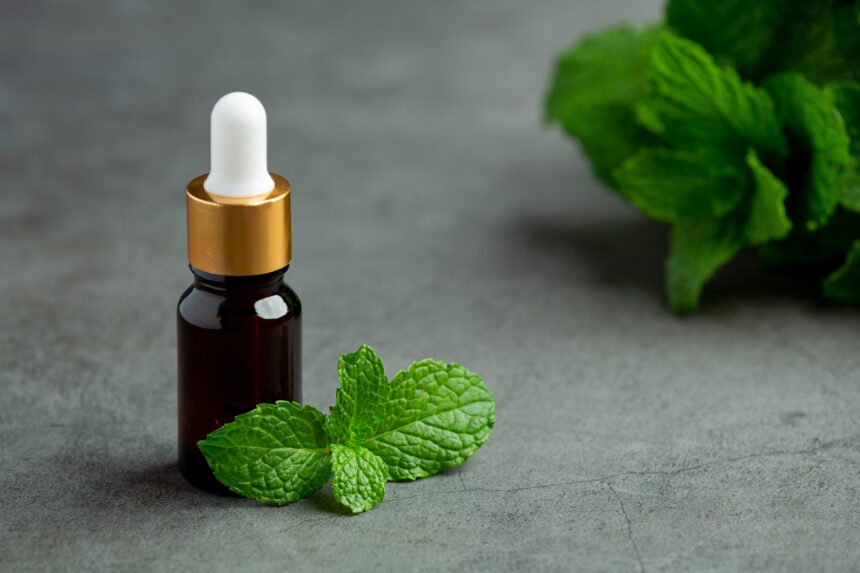Peppermint oil has long been a go-to natural remedy for digestive woes, extracted from the leaves of the peppermint plant (Mentha piperita), a hybrid of watermint and spearmint. Its key active compound, menthol, delivers cooling, antispasmodic, and anti-inflammatory effects that make it particularly useful for managing irritable bowel syndrome (IBS)—a common disorder affecting the large intestine, causing symptoms like abdominal pain, bloating, gas, diarrhea, and constipation. Backed by numerous studies and meta-analyses, peppermint oil stands out as an evidence-based option for symptom relief, often rivaling traditional medications like antispasmodics. In this blog post, we’ll explore the science behind how it helps, practical application methods, and important safety tips. As always, while promising, it’s not a cure—consult your doctor before starting, especially if you have other health conditions or are on medications.
How Peppermint Oil Helps with IBS: The Mechanisms and Benefits


IBS symptoms stem from gut hypersensitivity, irregular muscle contractions, and inflammation, and peppermint oil targets these directly for noticeable relief. While effects can vary, many users report improvements in pain and bloating within days of consistent use.
- The Core Mechanism: Muscle Relaxation and Pain Reduction: Menthol in peppermint oil acts as a natural antispasmodic, relaxing the smooth muscles of the gastrointestinal tract by blocking calcium channels and modulating transient receptor potential channels (TRPM8 and TRPA1). This reduces spasms in the colon, easing abdominal pain and cramping. It also dulls pain receptors, decreasing visceral hypersensitivity—a hallmark of IBS. Studies show this leads to better stool consistency and reduced urgency, benefiting both IBS with diarrhea (IBS-D) and constipation (IBS-C).
- Anti-Inflammatory and Antimicrobial Effects: Peppermint oil combats inflammation by suppressing inflammatory mediators and has antimicrobial properties against pathogens like H. pylori and E. coli, which may contribute to IBS flare-ups. This helps alleviate bloating, gas, and flatulence by promoting a healthier gut environment. A meta-analysis of 12 trials involving 835 adults found peppermint oil significantly improved overall IBS symptoms and abdominal pain compared to placebo.
- Additional Benefits and Evidence: Beyond core symptoms, it may modulate psychosocial factors like stress, which exacerbate IBS, through potential anxiolytic effects. Multiple randomized controlled trials, including those from 1979 to 2016, confirm its superiority over placebo for reducing pain, distention, and flatulence, with a number needed to treat as low as 3. In pediatric studies, it reduced pain severity and frequency in functional abdominal pain without adverse events. A 2022 review of 10 studies with 1,030 participants noted better overall symptom relief and pain reduction than placebo, though with more side effects. Some research suggests it’s as effective as fiber or antispasmodics, but benefits may wane after stopping use, indicating the need for ongoing intake.
While not instantaneous like a painkiller, consistent use can provide relief from abdominal discomfort and bloating within a few days, making it a valuable tool in IBS management.
How to Apply Peppermint Oil: Practical Methods and Dosage


For IBS, the key is using peppermint oil correctly to maximize benefits and minimize irritation. Oral ingestion via capsules is the most studied and effective method—avoid applying it topically or inhaling for gut issues, as those target headaches or nausea instead.
- Preferred Form: Enteric-Coated Capsules: These are essential because they protect the oil from stomach acid, preventing premature release and ensuring it reaches the intestines where it’s needed. Swallowing pure oil or non-coated forms can cause heartburn. Take them whole with water—do not chew or break.
- Dosage Guidelines: For adults and children 12+, start with 1 capsule (typically 180-200 mg or 0.2 mL of peppermint oil) three times daily. If ineffective, increase to 2 capsules three times a day. For children 8-11, use 0.1-0.2 mL three times daily; avoid under 8 due to limited data. Trials often used 180-400 mg three times daily for 2-4 weeks.
- Timing and Tips: Take 30-60 minutes before meals or snacks to aid absorption and avoid stomach upset. Leave a 2-hour gap before or after indigestion meds like antacids, as they can dissolve the coating. If self-treating, limit to 2 weeks; see a doctor if symptoms persist for longer-term use. Combine with lifestyle changes like a low-FODMAP diet for better results.
Pro tip: Look for high-quality, enteric-coated products from reputable brands to ensure purity and potency.


Safety Considerations: Side Effects and Precautions
Peppermint oil is generally safe when used as directed, with the FDA deeming it “generally recognized as safe.” However, it’s potent, so moderation is key.
- Common Side Effects: Mild issues include heartburn, nausea, abdominal pain, dry mouth, and a burning sensation around the anus. Allergic reactions (rash, itching, breathing issues) are rare but possible. Enteric coating minimizes heartburn by bypassing the stomach.
- Precautions and Interactions: Avoid if pregnant, breastfeeding, or with conditions like GERD, as it relaxes the lower esophageal sphincter. It may interact with antacids, blood pressure meds, or drugs like cyclosporine—check with a pharmacist. High doses could affect nutrient absorption or cause toxicity (e.g., kidney issues), but therapeutic doses are well below risky levels. If you miss a dose, skip it; don’t double up.
Final Thoughts: A Natural Ally in IBS Management
Peppermint oil offers a science-supported, accessible way to tackle IBS symptoms, primarily through its muscle-relaxing and anti-inflammatory powers. By opting for enteric-coated capsules at the right dose, you can target pain, bloating, and irregular bowel habits effectively. Start low, monitor your response, and integrate it into a broader plan including diet and stress management for optimal results.
That said, IBS is complex—if symptoms worsen or persist, seek professional help to rule out other issues. Have you used peppermint oil for IBS? Drop your tips in the comments!


